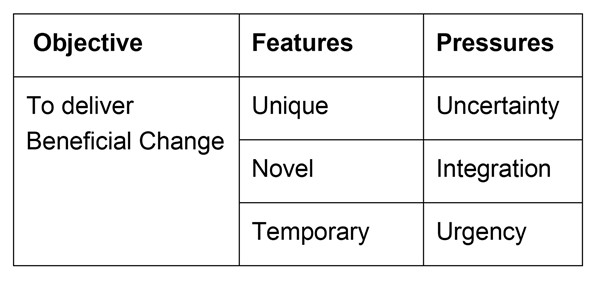SECOND EDITION
By Ricardo Viana Vargas, PhD
Lisbon, Portugal
SUMMARY
Given the natural speed and dynamism of the world, agility and sense of urgency has become preponderant in all projects. Challenging deadlines and budget make the management of these projects a risky activity. The more time and cost become challenging, the need for a more meticulous and detailed planning becomes fundamental. On the other hand, the urgency in the planning of these activities often directly affects the quality of the developed plans.
This article aims to discuss the costs and benefits of speed in developing a project plan and proposes a basic process that consists of 10 steps to plan and 10 steps to track a project in a short time. The process aims to simplify and prioritize critical documents to be developed in order to ensure the purpose, scope, deadlines and budgets, as well as direct restrictions of the project to be developed.
Finally, the article presents a list of success factors to be observed to handle and quickly develop effective project plans.
URGENCY: THE COSTS AND BENEFITS OF SPEED
A project is carried out to produce a beneficial change in the environment and it has three features (TURNER & MÜLLER, 2003):
- It is unique: there are not equal previous projects.
- It is new: previous projects did not use the same approach.
- It is temporary: it has a beginning and an end.
These features produce certain pressures, like the sense of urgency, the uncertainty and the need of integration. The urgency is directly related to the production of results within the shortest time.

Exhibit 01- Projects’ features (TURNER & MÜLLER, 2003)
According to Betty Sue Flowers (MARCUS, 1998), people must have a sense of urgency even when they are facing a good situation. The sense of urgency doesn’t come only from an emerging crisis, but also from the need to be ready for any situation, including opportunities.
Given this scenario, it is essential that the project manager respond immediately to requests from customers and from other interested with a legitimate sense of urgency (KERNION, 1999). Thus, the challenge becomes balancing the sense of urgency and pressure with time for reflection, experimentation and innovation that a unique product or service will require to be developed (EPPLER & SUKOWSKI, 2000).
SIMPLIFIED FLOW FOR THE DEVELOPMENT OF PROJECT PLAN
In order to directly attend the need, we need to simplify the management process. Simplification occurs through careful analysis of the processes that may be deemed fundamental and essential. Importantly, only the processes considered crucial must be carried on, since we consider the speed of development as a priority, but it does not mean that other processes that are not listed cannot bring results in project planning.
The proposed flow is based on the PMBOK ® Guide (PMI, 2008), highlighting the sequence of activities that make up the process, starting from an assumption that there is already an assigned project manager. From the detailed processes in the guide, we set up a flow with 10 processes, as highlighted in Exhibit 01 and detailed below.
More…
To read entire article, click here
Second Editions are previously published papers that have continued relevance in today’s project management world, or which were originally published in conference proceedings or in a language other than English. Original publication acknowledged; authors retain copyright. This paper was originally presented at PMI® Global Congress 2011—North America, Dallas, TX, USA. It is republished here with the author’s permission.
How to cite this paper: Vargas, R. V. (2023, 2011). Urgency: A Critical Factor in Project Planning; Originally published in Proceedings of PMI® Global Congress 2011—North America; republished in the PM World Journal, Vol. XII, Issue XI, November 2023. Available online at https://pmworldlibrary.net/wp-content/uploads/2023/11/pmwj135-Nov2023-Vargas-Urgency-a-Critical-Factor-in-Project-Planning-2nd-ed.pdf
About the Author

Ricardo Viana Vargas, PhD
Minas Gerais, Brazil
Lisbon, Portugal
![]()
Ricardo Viana Vargas is Managing Partner at Macrosolutions, past Executive Director of the Project Management Institute’s Brightline Initiative, past Director of the United Nations Office for Project Services (UNOPS) Infrastructure and Project Management Group, and former Chair of the PMI Board of Directors. Passionate about transforming ideas into action and a popular speaker at international PM events, Ricardo is recognized worldwide as a chief advocate for the project economy. Specializing in implementing innovative global initiatives, capital projects and product development, he has directed dozens of projects across industries and continents, managing more than $20 billion in global initiatives over the past 25 years.
Ricardo shares his expertise with millions of professionals around the globe through his “5 Minutes Podcast,” which he’s hosted since 2007. He has written 16 books on project management, risk and crisis management, and transformation, which have been translated into six languages and sold more than half a million copies. His latest book Project Management Next Generation: The Pillars for Organizational Excellence, in partnership with Dr. Harold Kerzner and Dr. Al Zeitoun has recently been released.
Ricardo’s influence on project management was affirmed when he became the first Latin American to be elected Chairman of the Project Management Institute. More than two decades ago, he founded Macrosolutions, a global consulting firm with international operations in energy, infrastructure, IT, oil and finance. Between 2016 and 2020, Ricardo directed the Brightline Initiative, a Project Management Institute think tank bringing together leading organizations in a coalition dedicated to helping executives bridge the expensive, unproductive gap between strategic design and delivery.
Prior to his work with Brightline, Ricardo was Director of the United Nations Office for Project Services (UNOPS) Infrastructure and Project Management Group, leading more than 1,000 projects and $1.2 billion in humanitarian and development projects. He has worked as a venture capitalist and entrepreneur in artificial intelligence, blockchain, big data, chatbots and machine learning resulted in tools and products that have revolutionized how users bring agility and agile management into project management software.
Ricardo holds a Ph.D. in Civil Engineering from Federal Fluminense University in Brazil and an undergraduate degree in Chemical Engineering, as well as a master’s degree in Industrial Engineering from Federal University of Minas Gerais in Brazil. He can be contacted at ricardo@ricardo-vargas.com or ricardo-vargas.com or Linkedin: com/in/ricardovargas









